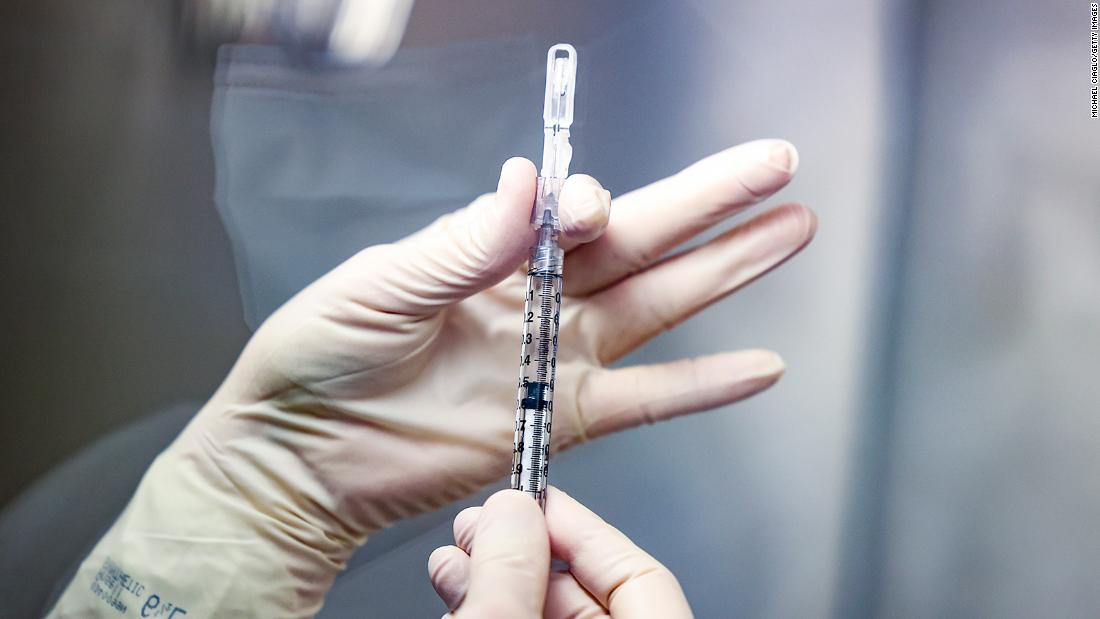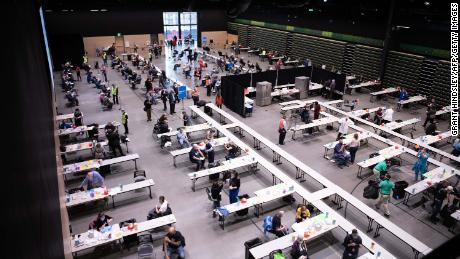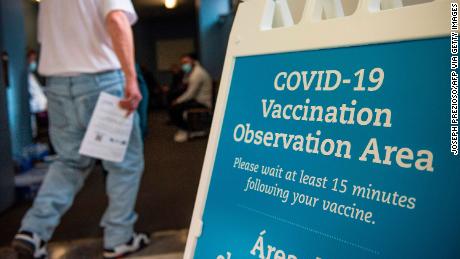Johnson & Johnson’s trials show 85% efficacy against severe Covid disease. Company will apply for FDA emergency authorization next week.
The vaccine was 72% effective against moderate and severe disease in the US, the company said.
It’s a striking difference from vaccines from Pfizer/BioNTech and Moderna, and it may give pause to people uncertain about which vaccine to get or when they can get one. The vaccines already on the market in the US are about 95% effective overall against symptomatic Covid-19, with perhaps even higher efficacy against severe cases.
But experts say the Johnson & Johnson vaccine will still be useful against the pandemic in the United States and around the world.
“Among all participants from different geographies and including those infected with an emerging viral variant, Janssen’s COVID-19 vaccine candidate was 66% effective overall at preventing the combined endpoints of moderate and severe COVID-19, 28 days after vaccination. The onset of protection was observed as early as day 14,” the company said in a statement.
Janssen is Johnson & Johnson’s vaccine arm.
“The level of protection against moderate and severe COVID-19 infection was 72% in the US, 66% in Latin America and 57% in South Africa, 28 days post-vaccination.”
“We’re 85% effective at preventing severe disease, which we define as disease that makes you feel particularly sick at home, or may go to the hospital, or worse,” Dr. Mathai Mammen, global head of research and development at Johnson & Johnson, told CNN.
“And we are right now completely protective, it would appear 100% protective, against disease that actually does make you go to the hospital, we’re 100% protective against death.”
The company said the results held up across all age groups and people of various ethnicities.
Mammen said the company was working to file for emergency use authorization from the US Food and Drug Administration “inside of a week.” It will be the third company to seek EUA from the FDA for a coronavirus vaccine. Vaccines made by Moderna and by Pfizer/BioNTech were authorized in December and are now being given to millions of Americans.
Dr. Paul Offit, a vaccine expert at the University of Pennsylvania and a member of the FDA’s Vaccines and Related Biological Products Advisory Committee, said that under normal circumstances, there might not be much of a market for a vaccine that is significantly less effective than two others already on the market. But he added that these are not normal times, with a pandemic raging and shortage of vaccines.
Pfizer and Moderna both use genetic technology called messenger RNA, or mRNA technology. Johnson & Johnson uses a weakened common cold virus, known as adenovirus, to carry genetic instructions into the body to prompt an immune response.
“In a better world, we would have abundant quantities of this messenger RNA vaccine, Pfizer and Moderna, and that would be damning for a vaccine that’s clearly less effective. But that said, we have limited quantities of mRNA vaccine,” Offit said.
Offit has been vaccinated, but said if he had not, he would first search out a Pfizer or Moderna vaccine, and then if he couldn’t find one in reasonable period of time, he would take a Johnson & Johnson vaccine if it was available.Offit said getting one brand of vaccine and later on getting a different vaccine should not pose safety issues.
“I would make an effort to get an mRNA vaccine first,” Offit said. “Not being able to get it, and knowing I might not be able to get Pfizer or Moderna for many months, and knowing this virus is still ranging across the country, I would take J&J in the secure knowledge that I could get Pfizer or Moderna later.”
The Johnson & Johnson vaccine has advantages, said Dr. Anthony Fauci, director of the National Institute of Allergy and Infectious Diseases
“A vaccine that’s inexpensive, that’s a single dose, and that has no cold chain requirements — that’s pretty good,” Fauci told CNN.
Plus no cases of severe allergic reaction called anaphylaxis were seen in any of the volunteers, the company said.
Fauci said the results would look even better if Janssen did not have to compete against the 94% and 95% efficacy seen in trials of the Pfizer and Moderna vaccines.
“You know what the problem is? If this were out there and we didn’t have the Moderna 94-95% …. We would have said wow, a 72% effective vaccine that’s even more effective against severe disease is really terrific,” he said in a telephone interview.
“But now we’re always judging it against 94 to 95%. Having said that, this is a vaccine that could have use particularly in developing countries to keep people out of the hospital. It has a very good efficacy against severe disease,” Fauci added.
Mammen said the Janssen vaccine was tested later, after new variants of coronavirus were already circulating. One in particular, called B.1.135, was dominant in South Africa when the vaccine was tested there. This variant has mutations that might be expected to weaken the vaccine’s effects somewhat.
But it still protected people, Mammen said.
“I’m looking at that South African variant, and I’m seeing that we’re able to completely protect against concerning levels of illness, where one might go to a hospital,” he said.
Plus people do not have to worry about coming back for a second dose.
“We really wanted it to be a single dose. So we optimized our antigen so that we get enough immunogenicity after one dose, as opposed to two,” he said.
“If it’s a single-dose vaccine, then a billion vaccine doses would translate into a billion people vaccinated,” said Dr. Dan Barouch of Harvard Medical School, who helped develop the vaccine.
And, unlike the Pfizer and Moderna vaccines, it does not have to be stored in freezers. It can be stored for three months at refrigerator temperatures of 36 degrees to 46 degrees Fahrenheit.
Janssen is already testing a two-dose regimen of the vaccine and that could increase the efficacy, Fauci said.
“Let’s see what that shows. It could possibly bring it up to 90%,” he said. “Heck if you got 72 with a single dose, you would think you would do pretty good with a boost.”
The US federal government has contracted to buy 100 million doses of the vaccine and the company has been manufacturing doses for months in anticipation that it would work and would win EUA from the FDA.
A fourth vaccine is also jostling to join the mix in the US market. Maryland-based Novavax released preliminary data Thursday showing its candidate vaccine had an efficacy of 89% in trials in Britain. And AstraZeneca is finishing up Phase 3 clinical trials of its vaccine, as well.
The Janssen vaccine is made a little differently from the Pfizer and Moderna vaccines, which use raw genetic material called messenger RNA.
This one is a viral vector vaccine. It uses a common cold virus called adenovirus 26, which has been weakened so that it does not replicate in the body. It’s engineered to carry genetic material from the spike protein of the virus — that’s the part the virus uses to grab onto the cells it targets.
The vaccine prompts the muscle cells in the arm to produce these pieces of spike protein. The immune system recognizes them as foreign and builds a defense, so when a real virus tries to infect, the body is ready to fight it off.
Dr. Sanjay Gupta, Elizabeth Cohen and Keri Enriquez contributed to this story.
![]()








